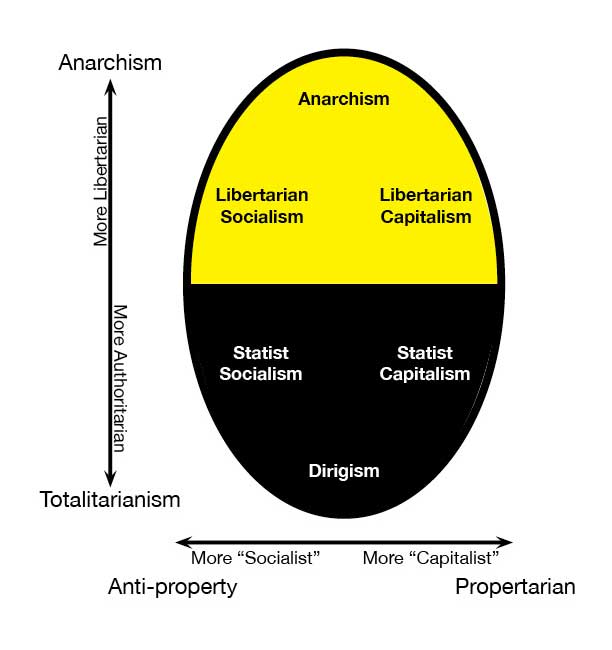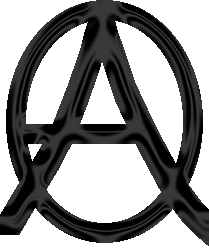
Definitions of Anarchism
Anarchism is a hotly disputed term. Like other terms, its meaning has changed over time. Further complicating the issue, different groups of people holding different ideologies have attempted to capture the term throughout history, broadening it or narrowing it according to their own particular beliefs and interests. The following is a short historical survey of what "anarchism" has meant.
| 1. | without ruler/throne; opposition to all political authority or compulsory government ("State")
Etymological definition from an without + archon ruler.
|
This is the earliest definition of anarchism. Even this original definition has been disputed by later anarchists who wish to broaden "rulership" to mean much more than political authority. However, the original etymological meaning is clearly referring to political authority. The Greek word archon means ruler, commander, chief, or king.
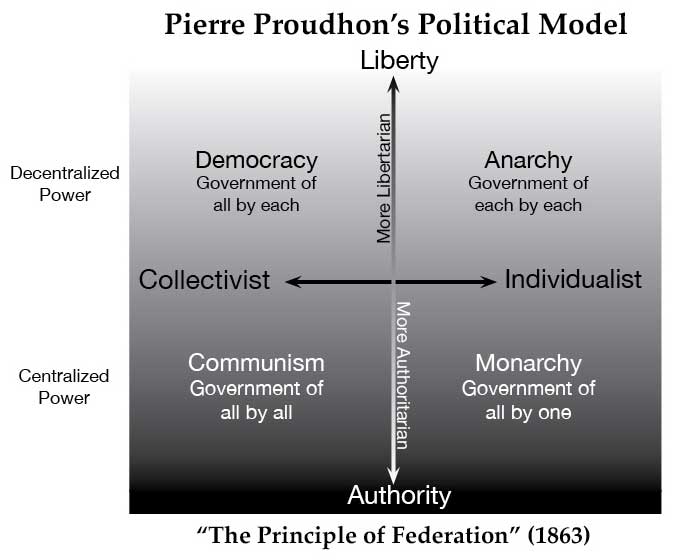
It is interesting that this etymological definition, which one could fairly call the original definition, quickly went out of fashion. To statists, anarchism and anarchy were confused with chaos and anomie. This was, of course, quite convenient for the existing regimes, for opposition to be written off as lawlessness and chaos. Pierre Proudhon, the seminal anarchist theorist and the man who popularized "anarchist" as a positive political label, adopted the original definition, adding an individualist-collectivist dimension. Proudhon gave us an early two-dimensional political ideology model.
It may not be clear to readers just what the difference is between "government of all by all" and "government of all by each." Proudhon explains it this way:
In the communist regime ... power is exercised in an undivided fashion by the collectivity just as it was before by the king alone. ... The forms of the liberal or democratic state ... differ radically from that of monarchy. They consist in the fact that power, instead of being collectively and indivisibly exercised as in the primitive community, is dispersed among the citizens, in one of two ways. In the case of a task which is physically divisible, such as the construction of a road, the commanding of a fleet, the policing of a town, or the education of the young, one divides the work into segments, the fleet into squadrons ... If the function is not divisible, it is left intact. Several officials may be appointed to deal with it. - Pierre Proudhon, The Principle of Federation
| 2. | government of each by each, i.e. absense of compulsory govenrment
Proudhon's definition, which is consistent with the etymological one.
|
It is interesting that Proudhon's definition of anarchism is one that denies that democracy (let alone communism) can be anarchist. It must be noted that Proudhon's notion of democracy is what today we might call centralized democracy, the statist democracy utilized by most developed States today. Proudhon did not consider decentralized federations - where members can opt out and create new groups - as democracy, but a likely characteristic of anarchy.
Proudhon considered communism and democracy to be incompatible with anarchism. Thus, sectarian anarcho-capitalists who claim that anarcho-communism and libertarian socialism are not real anarchism can quote Proudhon as support for their view. (This author disagrees, and holds a more tolerant 'anarchism-without-adjectives' position.)
As Bakunin replaced Proudhon in the early history of anarchist thought, and socialist exploitation theory became popular, a countervailing trend emerged - rejecting the individualist privatist position of Proudhon and all but forgetting moral autonomy and self-ownership as a part of anarchism.
| 3. | the no-government system of socialism [Kropotkin]
Socialist sectarian definition, broadening rulership to a generalized notion of authority that includes natural constraints.
|
Although the definition above was given by Kropotkin, to be fair it should be noted that this was not Kropotkin's primary definition of anarchism. In his Encyclopedia Britannica article on anarchism he gave the general definition:
ANARCHISM (from the Gr. av, and aoxn, contrary to authority), the name given to a principle or theory of life and conduct under which society is conceived without government - harmony in such a society being obtained, not by submission to law, or by obedience to any authority, but by free agreements concluded between the various groups, territorial and professional, freely constituted for the sake of production and consumption, as also for the satisfaction of the infinite variety of needs and aspirations of a civilized being. - Peter Kropotkin, "Anarchism" Encyclopaedia Britannica, 1910
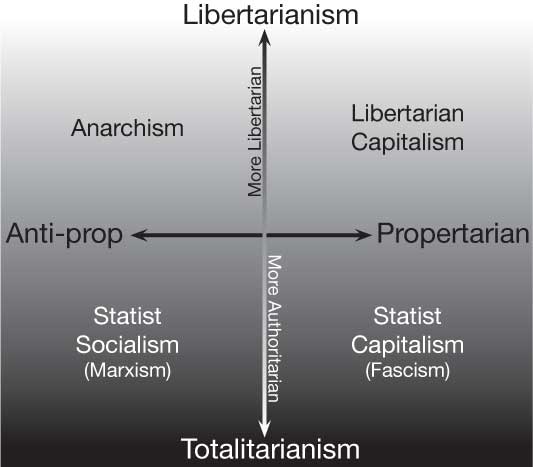
Even this ardent anarcho-communist counted all those opposing the State - whether communist, socialist, mutualist, or capitalist - as anarchists. His formal definition is consistent with the broad-tent etymological definition #1. However, since he was generally speaking to his communist and socialist cohorts, he often gave an alternative sectarian definition such as the one quoted above for definition #3.
This sectarian socialist definition does not define anarchism as support of liberty. Instead, it is support of both liberty and opposition to private property, the latter being the pet socialist peeve, and their interpretation of authority or rulership. In the 20th century, some anarcho-socialists added yet another alleged characteristic of rulership - hierarchy.
At any rate, the original meaning of anarchism as opposition to political authority - the right to rule and the duty to obey - has been (in some circles) watered with various ad hoc notions of authority, especially those involving the socialist exploitation theory. Many who consider themselves libertarian socialist use this definition of anarchism, as well as certain sectarian anarcho-socialists obsessed with trying to dismiss anarcho-capitalism.
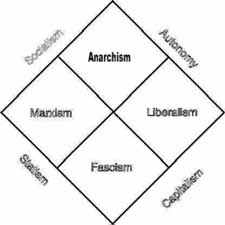
The two dimensional model of political ideology is not new. I first encountered it in an article by Jeff Draughn in a Utne Reader (1991) entitled Between Anarchism and Libertarianism.
Another source that takes anarchism[3] as the definition is the Anarchist International Information Service, with a diagram just like the one above, except rotated 45 degrees clockwise. (See diagram at right.)With the rise of anarcho-capitalism and voluntaryism, more people are getting back to the pure broad-tent definition of anarchism. The logical way to represent the eternal struggle between Liberty and Authority, along with a range of economic preferences would put Anarchism - pure liberty - at the opposite end of the spectrum from Totalitarianism - pure authority. For the horizontal dimension, it makes sense to use the most contested feature after the primary one concerning the amount of government power: what resource usage norms one prefers. The obvious measure is to take extreme neo-Lockean sticky property as one pole, and extreme collectivist collective property as the other.
| 4. | the theory or doctrine that all forms of government are oppressive and undesirable and should be abolished [American Heritage Dictionary - 3rd edition]
Modern definition, based on pure anti-statism, i.e. opposition to political authority
|
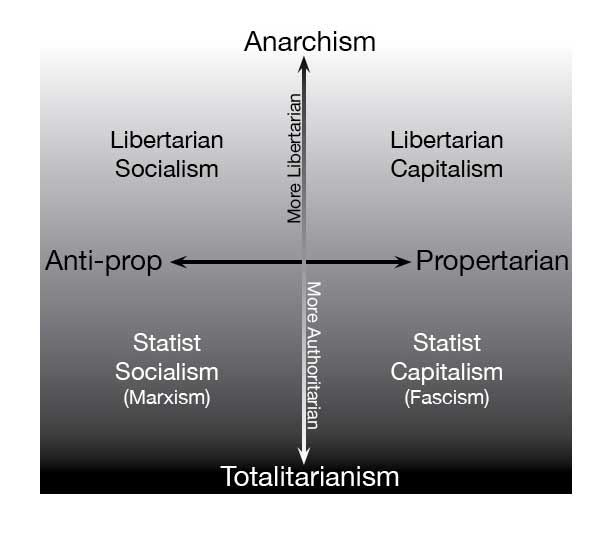
This modern definition is consistent with the original definition of anarchism. All who oppose the State in principle, that is, deny the legitimacy of political authority, are anarchist. Any belief that can be plotted on the top edge of the ideomap is an anarchist. Anyone in the upper half is a libertarian, using the relative definition of libertarianism.
While the ideomap seems to cover a broad range of political positions, it does not address those that are neutral or indifferent about property norms, such as green anarchism and feminist anarchism. However, since most people are concerned with how resources are used (even greenies and feminists), this framing is generally adequate.
Another economics-neutral definition of "anarchism" comes from Murray Bookchin's 1982 book The Ecology of Freedom: The Emergence and Dissolution of Hierarchy. Classical anarchists of the 19th century virtually never used the term "hierarchy," except when talking about the State apparatus or the Church. Bookchin's environmentalist-oriented term became popular among anarcho-socialists.
| 5. | opposition to all involuntary hierarchy [Murray Bookchin]
Bookchin definition, originally motivated by environmentalism and bioregionalism
|
The main problem with the Bookchin definition is the vagueness of "involuntary." Anarcho-capitalists see employment (and the teacher-student relationship) as voluntary hierarchy, while anarcho-socialists (with their exploitation theory) see employment as involuntary. These groups disagree about whether "voluntary" means not subject to aggression by others (anarcho-capitalists), or not subject to any constraints, even natural ones (anarcho-socialists.)
A major concern with the 2-dimensional ideology map shown above is that the affinity or 'distance' between schools of anarchism (or statism) are left unseen. The fact is that people who oppose rulership as their primary social or political value have a lot in common. These anarchists are, by definition (execept the sectarian one) comrades and cohorts in their love of freedom and opposition to tyranny. Yet the ideomap makes it look like Libertarian Socialists are just as close to Statist Socialists as they are to their individualist brothers. Similarly, libertarian capitalists, who hate the corporatism of Statist Capitalism, are shown as close to that despised position as to their brother anarchists. Thus, we can modify the diagram to show actual affinity or closeness in a philosophical sense:
Conclusion: The enemy is statism, rulership, authority. The enemy is not a flavor of economics that you dislike. We anarchists are all cohorts; we should not overlook possibilities for cooperation. We should be working together for liberty when we can.
